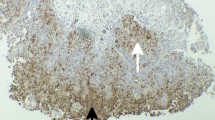Abstract
Purpose
Urothelial carcinoma has recently been shown to express several aquaporins (AQP), with AQP3 being of particular interest as its expression is reduced or lost in tumours of higher grade and stage. Loss of AQP3 expression was associated with worse progression-free survival (PFS) in patients with pT1 bladder cancer. The objective of this study was to investigate the prognostic value of AQP3 expression in patients with muscle-invasive bladder carcinoma (MIBC).
Methods
Retrospective single-centre analysis of the oncological outcome of patients following radical cystectomy (Cx) due to MIBC. Immunohistochemistry was used to assess AQP3 protein expression in 100 Cx specimens. Expression levels of AQP3 were related to clinicopathological variables. The impact of biomarker expression on progression-free, cancer-specific and overall survival was determined by multivariate Cox regression analysis (MVA).
Results
High expression of AQP3 by the tumour was associated with a statistically significantly improved PFS (75 vs. 19 %, p = 0.043) and CSS (75 vs. 18 %, p = 0.030) and, alongside lymph node involvement, was an independent predictor of PFS (HR 2.871, CI 1.066–7.733, p = 0.037), CSS (HR 3.325, CI 1.204–8.774, p = 0.019) and OS (HR 2.001, CI 1.014–3.947) in MVA.
Conclusions
Although the results of the study would be strengthened by a larger, more appropriately powered, prospective, multi-institutional study, our findings strongly suggest that AQP3 expression status may represent an independent predictor of PFS and CSS in MIBC and may help select patients in need for (neo-)adjuvant chemotherapy.

Similar content being viewed by others
References
Green DA, Rink M, Xylinas E et al (2013) Urothelial carcinoma of the bladder and the upper tract: disparate twins. J Urol 189(4):1214–1221
Rubenwolf PC, Georgopoulos NT, Clements LA et al (2009) Expression and localisation of aquaporin water channels in human urothelium in situ and in vitro. Eur Urol 56(6):1013–1023
Rubenwolf PC, Georgopoulos NT, Kirkwood LA, Baker SC, Southgate J (2012) Aquaporin expression contributes to human transurothelial permeability in vitro and is modulated by NaCl. PLoS ONE 7(9):e45339
Saadoun S, Papadopoulos MC, Hara-Chikuma M, Verkman AS (2005) Impairment of angiogenesis and cell migration by targeted aquaporin-1 gene disruption. Nature 434(7034):786–792
Rubenwolf PC, Otto W, Denzinger S, Hofstadter F, Wieland W, Georgopoulos NT (2014) Expression of aquaporin water channels in human urothelial carcinoma: correlation of AQP3 expression with tumour grade and stage. World J Urol 32(4):991–997
Otto W, Rubenwolf PC, Burger M et al (2012) Loss of aquaporin 3 protein expression constitutes an independent prognostic factor for progression-free survival: an immunohistochemical study on stage pT1 urothelial bladder cancer. BMC Cancer 12:459
Cheng L, Davison DD, Adams J et al (2014) Biomarkers in bladder cancer: translational and clinical implications. Crit Rev Oncol Hematol 89(1):73–111
Frantzi M, Makridakis M, Vlahou A (2012) Biomarkers for bladder cancer aggressiveness. Curr Opin Urol 22(5):390–396
Hautmann RE, de Petriconi RC, Pfeiffer C, Volkmer BG (2012) Radical cystectomy for urothelial carcinoma of the bladder without neoadjuvant or adjuvant therapy: long-term results in 1100 patients. Eur Urol 61(5):1039–1047
Burger M, Mulders P, Witjes W (2012) Use of neoadjuvant chemotherapy for muscle-invasive bladder cancer is low among major European centres: results of a feasibility questionnaire. Eur Urol 61(5):1070–1071
Kusayama M, Wada K, Nagata M et al (2011) Critical role of aquaporin 3 on growth of human esophageal and oral squamous cell carcinoma. Cancer Sci 102(6):1128–1136
Huang Y, Zhu Z, Sun M et al (2010) Critical role of aquaporin-3 in the human epidermal growth factor-induced migration and proliferation in the human gastric adenocarcinoma cells. Cancer Biol Ther 9(12):1000–1007
Jablonski EM, Mattocks MA, Sokolov E et al (2007) Decreased aquaporin expression leads to increased resistance to apoptosis in hepatocellular carcinoma. Cancer Lett 250(1):36–46
Acknowledgments
Peter C. Rubenwolf was in receipt of a clinical research fellowship from the Deutsche Forschungsgemeinschaft (Project Number RU 1433). The study was partly funded by a research Grant from the Reinhard-Nagel-Stiftung of the German Urological Society.
Conflict of interest
The authors declare that they have no conflict of interest.
Ethical standard
Collection of tissue specimens and use for the study had the approval of the local research ethics committee and full informed consent and has therefore been performed in accordance with the ethical standards laid down in the 1964 Declaration of Helsinki and its later amendments.
Author information
Authors and Affiliations
Corresponding author
Rights and permissions
About this article
Cite this article
Rubenwolf, P., Thomas, C., Denzinger, S. et al. Loss of AQP3 protein expression is associated with worse progression-free and cancer-specific survival in patients with muscle-invasive bladder cancer. World J Urol 33, 1959–1964 (2015). https://doi.org/10.1007/s00345-015-1574-8
Received:
Accepted:
Published:
Issue Date:
DOI: https://doi.org/10.1007/s00345-015-1574-8




